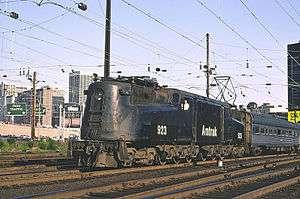Clocker (train)
|
PRR GG1 on a Clocker leaving Philadelphia in 1976 | |
| Overview | |
|---|---|
| Service type | Inter-city rail |
| Status | Discontinued |
| Locale | Northeast Corridor |
| First service | May 1, 1971 |
| Last service | October 28, 2005 |
| Successor | New Jersey Transit |
| Former operator(s) | Amtrak |
| Route | |
| Start | Philadelphia |
| End | New York |
| Distance travelled | 91 miles (146 km) |
| Average journey time | 95-110 minutes |
| Service frequency | Multiple weekday round-trips |
| On-board services | |
| Class(es) | Unreserved coach |
| Technical | |
| Rolling stock | Amfleet coaches |
| Track gauge | 4 ft 8 1⁄2 in (1,435 mm) |
| Electrification | Overhead catenary |
| Track owner(s) | Amtrak |
Clockers were regular passenger trains between Philadelphia and New York City on the Northeast Corridor; on the Pennsylvania Railroad they left each terminal on the hour until the 1950s and a less-regular schedule continued on Amtrak. The first train run by Amtrak was a Clocker that left Penn Station at 12:05 AM on May 1, 1971.[1] The last Clocker ran on October 28, 2005. To replace them, New Jersey Transit added four express trains between Trenton and New York City at times approximating the Clocker schedule.
Route
Amtrak's Clockers were rush-hour trains serving the commuter and day-trip market to New York City. New Jersey Transit (NJT) passholders could ride Clockers, which were shown in NJT's timetable as well as Amtrak's. They were popular with commuters from Trenton and Princeton Junction, as they were faster and more comfortable than NJT trains.
Clockers made all, or almost all, Amtrak stops between 30th Street Station in Philadelphia and Penn Station in New York, unlike Amtrak's Regional trains, which skip some stations. The trains were unreserved, coach class only, and used Amfleet rolling stock after the 1970s, although NJT stock was common in the last days of operation.
Naming
A Clocker was originally a Pennsylvania Railroad express train between New York and Broad Street Station in Philadelphia;[2] the name was unofficial, and PRR timetables didn't use it. Soon after Penn Station opened in 1910 the Philadelphia expresses began leaving each terminal on the hour, giving rise to the name (which the railroad itself seems never to have used). Until electrification in 1933 most Clockers were scheduled to leave and arrive on each hour; on a weekday in 1929 trains left each terminal from 7 AM to 10 PM. Faster schedules after electrification eliminated the on-the-hour arrival. In 1951 weekday Clockers left Philadelphia and New York 7 AM to 7 PM.
Amtrak did not use the term "clocker" until the October 1981 timetable.[3] Between 1979 and 1981 the public timetable showed individual names for each Clocker. The Clockers briefly were called Acela Commuter when Amtrak decided in 2001 to use that moniker for most trains along the Northeast Corridor. Following mass rider confusion between this service and the high-speed Acela Express service, the name reverted to Clocker in 2003.
Former names
| Name | Number | Notes |
|---|---|---|
| New York-Philadelphia | ||
| Philadelphian | 237 | |
| Betsy Ross | 211 | Sunday-only service ran Springfield-Washington |
| Keystone | 219 | Also the name of a Keystone Service train 1980-1981; see Valley Forge |
| Garden State | 221 | |
| William Penn | 223 | |
| Quaker City | 225 | |
| Rittenhouse | 227,241 | |
| Schuylkill | 229 | Discontinued April 26, 1980 |
| Philadelphia-New York | ||
| Manhattan Limited | 252 | |
| Gotham | 254 | |
| Edison | 200 | |
| New Yorker | 202 | |
| Big Apple | 204 | Also the name of a Keystone Service train 1980-1994; see Valley Forge |
| Central Park | 210 | Discontinued April 26, 1980 |
| Murray Hill | 220 | |
| Herald Square | 222 | |
Notes
- ↑ Boye Sagert (2007), 218.
- ↑ Rung, Jr., A. M. (January 1948). "Philly's personality trains". Trains.; 15
- ↑ "National Train Timetables". Amtrak. October 25, 1981. Retrieved 2010-04-18.
